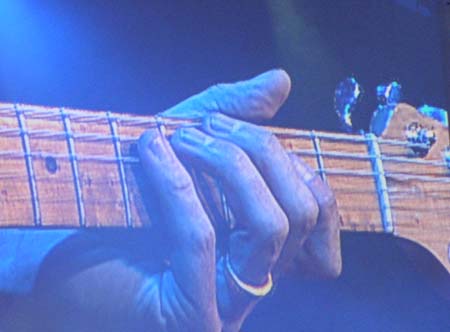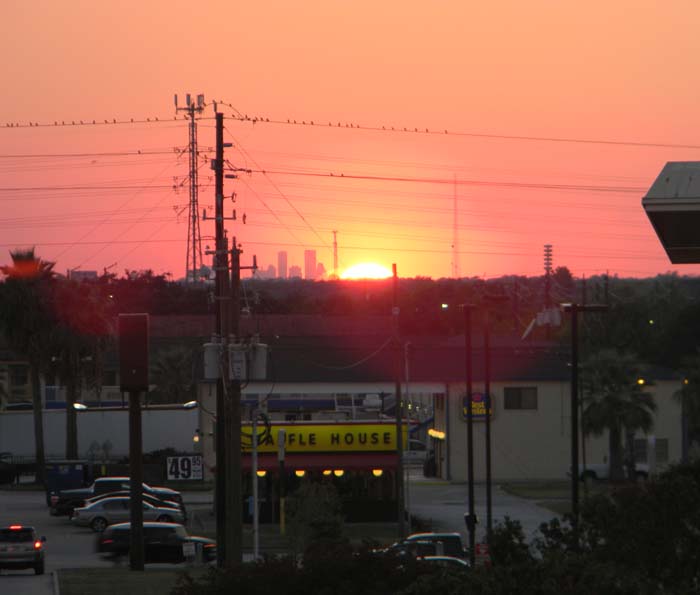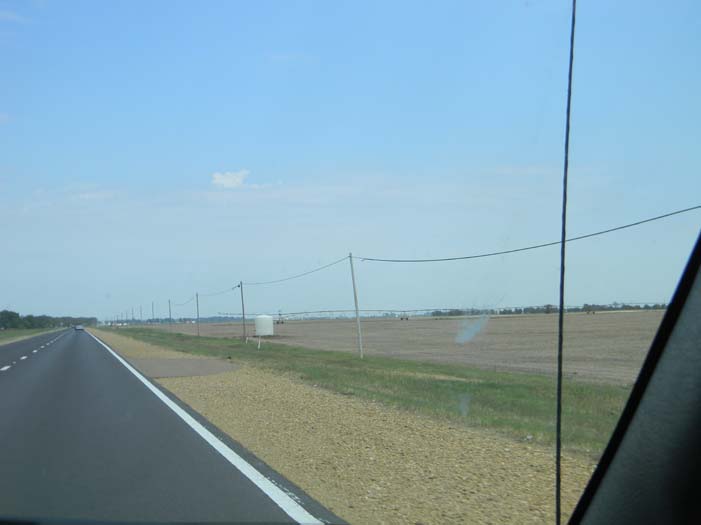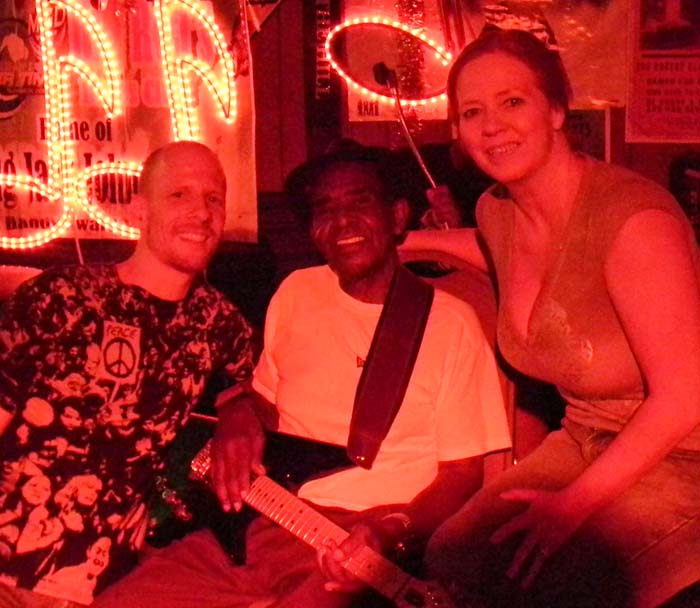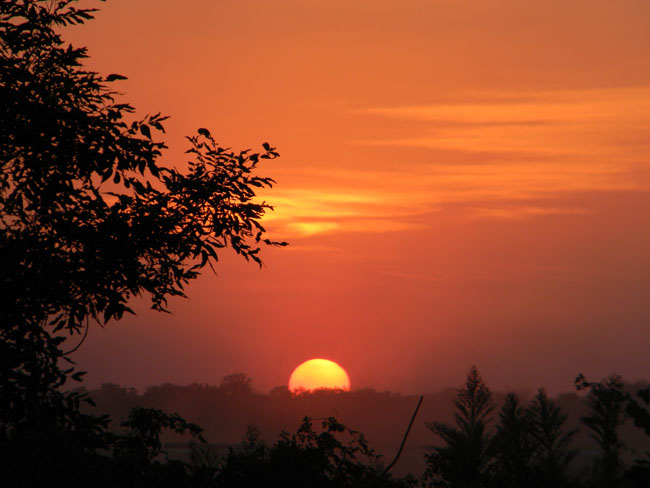Concert
Endless Boogie Rocks the Fillin’ Station – A Little Music for the Soul (Part Two)
Saturday night was the first outing for my new band ‘Endless Boogie’, and fun was had by all who ventured out to party with us at the Fillin’ 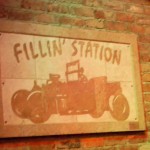 Station in Kingston Springs, TN. The club, owned by Patrick Weickenand, was the perfect setting for my long awaited rock n’ blues experiment. Small, intimate, and loaded with character, the club is housed in an old garage right out of yesteryear, hence the name, and a favorite watering hole for the locals on the west side of town.
Station in Kingston Springs, TN. The club, owned by Patrick Weickenand, was the perfect setting for my long awaited rock n’ blues experiment. Small, intimate, and loaded with character, the club is housed in an old garage right out of yesteryear, hence the name, and a favorite watering hole for the locals on the west side of town.
Our trio started out with a couple of instrumentals to get things going before switching to some vocal-based tunes. The place wasn’t too busy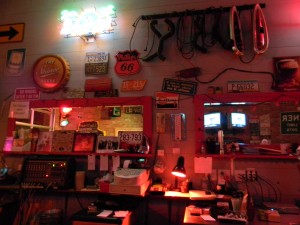 during our first set, so Patrick, who was working the bar, had time to sit in on harp for a few tunes in between slinging beers. Patrick is one of the nicest guys you’ll ever meet, and undoubtedly contributes greatly to the warmth and charm of this unique place. Anyone who has ever played the Fillin’ Station knows that Patrick is a great harp player, and he’s frequently requested to ‘sit-in’ from behind the bar with many a band. So several times throughout this night he joined in for some fun jams (check out the video below).
during our first set, so Patrick, who was working the bar, had time to sit in on harp for a few tunes in between slinging beers. Patrick is one of the nicest guys you’ll ever meet, and undoubtedly contributes greatly to the warmth and charm of this unique place. Anyone who has ever played the Fillin’ Station knows that Patrick is a great harp player, and he’s frequently requested to ‘sit-in’ from behind the bar with many a band. So several times throughout this night he joined in for some fun jams (check out the video below).
Fran Breen (drums) and Mike Chapman (bass), aside from being good friends of mine, are seasoned pros and I was thrilled to have them on the gig. Talk about groove, boy these guys can lay it down! I had an absolute blast playing with them, and we plan to do this on a regular basis, schedules permitting. As of right now our next outing will be Friday, December 3rd back at the Fillin’ Station.
By the third set, the place had erupted into a full-blown dance party which held through to the end. People were even dancing on Whipping Post (if you’ve ever tried to dance to this song you know why this is significant). All in all it was a triumphant beginning to this new project, a project born out of my need for “a little music for the soul”.
Eric Normand and Endless Boogie – A Little Music for the Soul
As a professional freelance musician working and living in Nashville, much of the work I perform is for other people’s entities, as is true for many hired guns. I’m not complaining mind you, this is how the bills get paid. My regular gig as tour manager/guitarist for Rhett Akins occupies many weekends throughout the year, and sporadic nightclub gigs and songwriter recording projects help to fill in the gaps. As rewarding as some of this work can be, it all comes under the heading of ‘gun for hire’ which means I must meet somebody else’s expectations, as they are footing the bill, often adjusting my musical tastes and desires to fit the gig.
So whenever it’s feasible, I take on gigs purely for my own musical expression, a little ‘music for the soul’ as I call it. Now that fall is here and the annual touring/festival season is drawing to a close, I’ll have a little more time for these kinds of endeavors. With that, I’m excited to tell you about my new project – Eric Normand and Endless Boogie. The concept of this band is simple. I will play only music that I enjoy playing, with people whom I enjoy playing, in venues that are enjoyable to play.
Growing up in the 70s and 80s I always looked back a few years to find my musical heroes; Jimi Hendrix, the Allman Brothers, ZZ Top, John Lee Hooker, and to this day this is still some of the most expressive music I ever play. So in my new Nashville based ‘fun band’ that’s just what were going to do. The song list will contain Hendrix classics like Little Wing, Voodoo Child, and All along the Watchtower, Allman Brothers classics like You Don’t Love Me, Ain’t Wastin’ Time No More, Melissa, and Whipping Post, classic blues songs like Freddie King’s Going Down, John Lee Hooker’s Hug You, Kiss You, Squeeze You, and even a few of my favorite instrumentals by Miles Davis and The Meters. Needless to say, we will put our own spin on these.
As I live in Nashville, and this kind of song list will not command top pay, getting great players to commit to a gig like this isn’t easy. All the best players are usually pretty busy taking the most lucrative gigs offered, and even if you get them to commit, something always seems to come up. So you either have to have two or three players deep on each instrument that know your material, or you have to wait till the last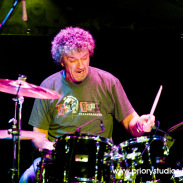 minute to book the players. I got real lucky for this first outing of Endless Boogie as a couple of my good friends, Fran Breen and Mike Chapman, just happened to be available.
minute to book the players. I got real lucky for this first outing of Endless Boogie as a couple of my good friends, Fran Breen and Mike Chapman, just happened to be available.
Fran Breen is a world-class drummer from Ireland that has worked on and off in the Nashville music industry for over 20 years. He’s played with a few major artists like Lucinda Williams, Nancy Griffith, Shelby Lynn, and is also an accomplished session drummer having played on countless projects over the years including the soundtrack for the movie “The Commitments” . He’s a top notch groove machine, especially when it comes to blues and funk, and I’m thrilled to have him on the gig. (Plus he is really funny and has the coolest Irish accent.)
Mike Chapman is one of the best bassists Nashville has to offer, and another ace in the hole who happens to be a good friend of mine. Mike’s first big gig was with Hank Williams Jr. in the early 80s, since which time he has played on innumerable A-list recording sessions ranging from literally all of Garth Brooks recordings to Leanne Rimes, Brooks & Dunn, Huey Lewis and countless 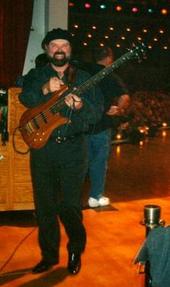 others. Mike has played bass on over 30 number 1 singles and the albums that he has played on have sold over 150 million copies. If it sounds like I’m bragging a little bit about these guys, it’s because I am. I mean how often does one get to say “My drummer played on the Commitments soundtrack” or “My bass player has been heard on 150 million albums”?
others. Mike has played bass on over 30 number 1 singles and the albums that he has played on have sold over 150 million copies. If it sounds like I’m bragging a little bit about these guys, it’s because I am. I mean how often does one get to say “My drummer played on the Commitments soundtrack” or “My bass player has been heard on 150 million albums”?
The last ingredient for my first outing with ‘Endless Boogie’ is a fun venue in which to play. The Fillin’ Station, located on Main Street in Kingston Springs, is the perfect venue for an intimate night of exploratory rockin’ blues and funk jams. While playing on big tours in front of thousands of people can be exciting, sometimes the finer points of the music get lost in the ‘bigness’ of those events. To this day, my favorite musical settings are small to midsize nightclubs, for it is in these small-town bars and juke joints of the world where the magic really happens. The Fillin’ Station is owned by Patrick Weickenand, former member of Eric Burdon’s band ‘War’ and one of the nicest guys you’ll ever meet who also blows a mean harp from behind the bar from time to time. The club is small but comfortable, and has an adjoining outdoor patio which fills up with locals on many a night. The club is just 25 minutes from downtown Nashville (exit 188 off of I40 west) and features live music four to five nights a week year-round, never with a cover.
I’ve been wanting to put together a group like this for a few years now, toying with the idea periodically, but never quite getting organized enough to make it happen. But I’ve realized that this is just what you have to do in Nashville, you have to find a way to not lose sight of your own vision even while you spend most of your time working for other people. My musical dreams at this point of my life are quite simple, I want to play the music that I love to play, the way I want to play it, hopefully taking a few others along for the ride.
So that’s it, all the essential ingredients are in line for an expressive night of music – songs I enjoy playing, people I enjoy playing with, and a place I enjoy playing at. Our show will be this coming Saturday, October 16 from 7:00 to 11:00. I’m really pumped for this show, so if you live in the Nashville area come on down for a night of Endless Boogie!
Rhett Akins Tour 2010 Wraps up with Two Shows in Texas
October 8, 2010 – Dallas, Texas
We left Nashville Thursday at midnight, bound for two shows deep in the heart of oil country, the first being at the oversized dance hall, Cowboys Red River in Dallas, Texas. Our regular bassist, Clint Jacobs, absent on this particular run, I sat in the front lounge chatting with his sub, friend and longtime Nashville veteran, Mike Chapman for a bit before heading to bed. This trip would normally take about 10 to 11 hours, but at about 5 AM I awoke and realized we had been stopped for a little bit. I drifted off for a while and when I got up around 10 I learned that Steve, our bus driver, got stuck in a massive traffic backup for three hours in the middle of the night, the result of an overturned tractor-trailer that had blocked the interstate. Scenarios like this are why we always allow for extra travel time on these trips. Nevertheless, the extra three hour wait added on to the middle of this 700 mile drive had left Steve exhausted, and we finally pulled into Dallas around 1:30.
As we entered the dark Honky Tonk, we noticed that musky stale beer odor inherent to these kinds of places, the kind of deep rooted 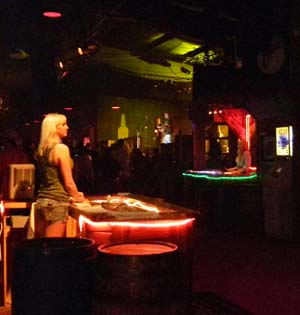 lingering odor that takes decades to create, and while barely noticeable amidst the hustle and bustle of nighttime business, is almost overbearing during the empty daytime hours. While we were setting up, Rhett had the runner take him on a brief tour Dealey Plaza, the infamous location of the assassination of JFK. A little while later he returned with some memorabilia, as apparently a JFK assassination history buff has some kind of ‘merch table‘ at this location. I’m not sure if this is somebody’s desire to inform the masses of this tragic conspiracy, or simply capitalism at its worst. (Maybe it’s a little of both.)
lingering odor that takes decades to create, and while barely noticeable amidst the hustle and bustle of nighttime business, is almost overbearing during the empty daytime hours. While we were setting up, Rhett had the runner take him on a brief tour Dealey Plaza, the infamous location of the assassination of JFK. A little while later he returned with some memorabilia, as apparently a JFK assassination history buff has some kind of ‘merch table‘ at this location. I’m not sure if this is somebody’s desire to inform the masses of this tragic conspiracy, or simply capitalism at its worst. (Maybe it’s a little of both.)
Other than watching a little bit of a fascinating assassination documentary, the rest of this day, and night for that matter, were rather uneventful. I wish I could say that it was an exciting memorable show, like most of our shows, but it wasn’t. The audience just kinda laid there. Don’t get me wrong, the 1500 or so in attendance danced and drank, and even made some noise after some songs, it was just one of those nights that felt like it never quite got there. I later reiterated to Rhett one of the tour’s long standing inside jokes “Out of all the shows we’ve ever done together, that was definitely one of them.”
Onward to Baytown
Baytown is a suburb of Houston, and a city of roughly 80,000 deep in the heart of oil country. We arrived to a hotel parking lot in the wee hours of the morning and taxied the bus over for load in around noon. On the previous day, everything had gone according to plan with no surprises, while this day would turn out to be full of surprises, the first being my discovery of a miscommunication regarding our ‘bus stock’. Our bus stock is a list of beverage and food items which appears on our rider, and is required, in most cases, to be delivered to our bus upon arrival as it serves to be lunch for our crew. I never got the memo that they wouldn’t be providing this and, fortunately, they were gracious enough to send somebody for it at the last-minute.
The next surprise came a couple of minutes later when the event coordinator informed me that they were having problems with the rented generator. It turns out that the generator rental company arrived earlier in the morning to drop off the generator, and then left without showing anybody how to work it. Around the same point in time I was introduced to the house sound technician whose introduction consisted of “Glad to meet you, I hope you brought a lot of patience with you because we’re running way behind.” “Glad to meet you too.” Next would come what was perhaps the biggest hurdle we would have to overcome on this day that was quickly evolving into what I commonly refer to as “a challenge” otherwise known as a good old-fashioned pain in the ass. That being, the stage from hell.
Upon setting foot upon this tin nightmare, I was baffled to see a gaping four-inch wide “space” that ran lengthwise across the 30 foot stage at about 5 foot intervals. “Well that’s a great way to break an ankle if I’ve ever seen one!” I commented to the promoter, who acknowledged “Yeah it is, I didn’t notice that before.” To make matters worse, a round piece of steel pipe protruded upward from this “space” at 6 foot intervals, serving as a strategic array of would-be landmines for everybody to trip over for the day. After some discussion with the promoter, we determined that we needed some rubber mats or plywood to place on top of this unsafe deck. A little while later I discovered a huge role of thick old industrial carpet backstage and, while it initially looked like it might serve our purpose, I quickly discovered that it was full of “fire ants”. I also learned, very quickly mind you, that fire ant’s bite! The bites on my fingers and hand still swollen as I write this.
One of the event coordinators suggested some four by eight sheets of rubber matting and, after I concurred that it might work, he set out for Home Depot. Around this time, I asked Scott, our other guitarist and part-time “Macgyver” if he could try to figure out the generator issue. A little while later a truck arrived with 10 sheets of rubber matting and I began to direct some stagehands to help ‘rubberize’ our stage while Scott dug into the genie. A couple of hours later and the stage was covered with a solid rubber matting (we had to cut holes for the protruding steel pipe with a drill and utility knife), Scott had brought the generator to life, and we began our load in and sound check.
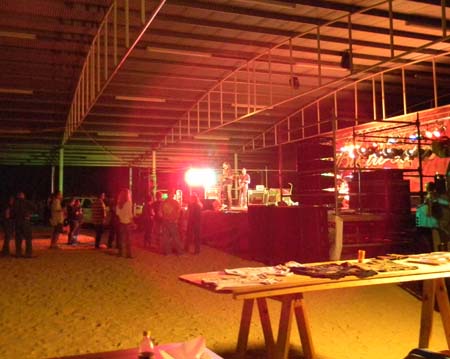 After the sound check, we all feasted on some locally famous barbecue, and went to the hotel for some downtime before the show. I returned to the venue around 7:30 hoping to catch some of up and coming and Nashville based Matt Stillwell’s, set. Unfortunately, because one of the other acts, George Dukas, was running late, their performance times were swapped, and I arrived after their show had already ended. We began our show at 9:30 on the dot, surprisingly right on time considering the chaotic mess of the day we had just encountered. This event was the annual “Helping a Hero Benefit” put on by the Baytown Police Department, and served to help raise money for a fund for families of officers lost in the line of duty. While the attendance was less than desired, the quality of the audience was anything but lacking. A handful of town folk that did show up spent quite a bit of money on some big dollar auction items for this great cause and stayed for the entirety of our 90 minute set. Mike Chapman, who had only played with us on a couple of other occasions, nailed the show to the floor, his 3+ decades working in the Nashville music industry recording with such giants as Garth Brooks, LeeAnn Rimes, and countless others, no doubt aiding in his proficiency.
After the sound check, we all feasted on some locally famous barbecue, and went to the hotel for some downtime before the show. I returned to the venue around 7:30 hoping to catch some of up and coming and Nashville based Matt Stillwell’s, set. Unfortunately, because one of the other acts, George Dukas, was running late, their performance times were swapped, and I arrived after their show had already ended. We began our show at 9:30 on the dot, surprisingly right on time considering the chaotic mess of the day we had just encountered. This event was the annual “Helping a Hero Benefit” put on by the Baytown Police Department, and served to help raise money for a fund for families of officers lost in the line of duty. While the attendance was less than desired, the quality of the audience was anything but lacking. A handful of town folk that did show up spent quite a bit of money on some big dollar auction items for this great cause and stayed for the entirety of our 90 minute set. Mike Chapman, who had only played with us on a couple of other occasions, nailed the show to the floor, his 3+ decades working in the Nashville music industry recording with such giants as Garth Brooks, LeeAnn Rimes, and countless others, no doubt aiding in his proficiency.
This stressful day came together as the result of a lot of teamwork. Scott, with some background in electronics, was apparently the only person on site possessing the knowledge it would take to make that generator come to life and power the show. The Baytown police went and purchased the rubber mats for the stage. Our bus driver, Steve provided some of the tools that were necessary for our rubber stage modifications. Matt Stillwell and band was gracious enough to perform their show two hours ahead of schedule. In hindsight, it’s funny, even kind of ironic, that while the day before had gone so smoothly, and it’s show had felt so sluggish (despite a crowd of almost 2000), that this difficult day, despite its low attendance and being full of problems, delivered a concert experience that was far more rewarding. Put these two wildly different events and shows together and you wind up with one great day and one great show – A fitting end to our 2010 touring season.
Clarksdale, Mississippi – Exodus and Photo Journal
While we awoke Sunday morning in high spirits, we were sad to see this trip drawing to a close. What was originally planned as a simple three-day getaway wound up being a prolific, life-changing experience. We thanked Marc for her hospitality and informed her that the Shack up Inn had just become at least an annual destination for us. As we made our exodus, heading north on Highway 61, we again took in to view a seemingly endless sea of cotton. We basked in the memories of the trip for most of the five hour drive home, recounting several high points still fresh in our minds.
While our explorations may not have revealed every facet of this community, this it did reveal; Clarksdale, while being one of the poorest places we have ever visited (economically speaking), is rich in its heritage, rich in spirit, its wealth defined by the warm and open nature of many of its citizens, and by this community’s enduring and ongoing contributions to the vital music our world so badly needs. In the circles we traveled during our stay, all of the locals we encountered were friendly and courteous, seeming to understand and appreciate the musical history that was born unto this place and the interest it still procures. It is an atrocity that most Americans are unaware of the cultural and musical heartbeat that dwells here.
Through a continuing appreciation for the music and culture of the Delta by some unlikely world citizens, citizens from every race, sex, and ethnic background, Clarksdale is a true melting pot, even if the pot is somewhat temporary. People from all walks of life and from every corner of the U.S., Europe, Asia, and beyond gathering in these sacred music halls for some song and dance – this isn’t history, this is today, and tomorrow, and I believe that many who visit Clarksdale will forever carry a piece of this culture and music with them, perhaps even a renewed sense of hope and purpose from their experiences here. I know we will. We came for a vacation, and while it was all of that, the experience was transformational, a musical and cultural revelation we are thankful to have had.
If you are a fan of blues or blues-influenced music, the Clarksdale experience is a must, there is a deep rooted blues subculture alive and well here. If you are a history buff, you can learn more about the American struggle by visiting this place for just one day then you can from most history books. If you just want to have a great vacation, you can do that too.
Feeling compelled to document this journey as thoroughly as possible, Kelly and I took around 500 photos over this three-day adventure. While ‘vacation pictures’ are never as interesting to anyone else as they are to the vacationers, we have decided to post most of them in a photo Journal for all to see. I have broken them down into several albums, each listing the day and the subject matter. If you are considering a trip to Clarksdale, or just curious about the place, this photo album should provide some perspective. Eric and Kelly’s Clarksdale Photo Journal
Clarksdale, Mississippi – Verse Three and Outro
Saturday Morning at the Shack Up Inn
We woke up kind of late on Saturday morning, a light rain falling on this grey but warm September day. Although we had initially planned to check out and head to Memphis around noon, we felt like our journey here wasn’t complete and that we would be doing ourselves an injustice by not staying for one more day. Memphis would just have to wait for another time. So after a little breakfast on the screened in back porch, I walked over to the lobby to see if we could stay for one more night. I explained to Marc, the woman working at the front desk, that we were having such a great time in Clarksdale and wanted to stay for one more night. “All our shacks are booked for tonight, but give me a moment.” With that, she disappeared into a back room, returning a moment later with some good news. 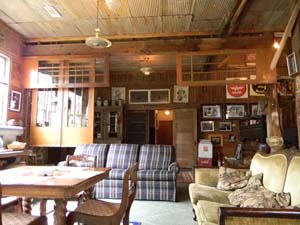 “Guy said that we can rent you a room at ‘Bill’s house’ if that can work for you.” “Sure, that sounds good.” A minute later, I was introduced to Guy who walked me over to the house to show me the set up.
“Guy said that we can rent you a room at ‘Bill’s house’ if that can work for you.” “Sure, that sounds good.” A minute later, I was introduced to Guy who walked me over to the house to show me the set up.
As it turned out, ‘Bill’s House’ is a magnificent 3000 square foot, three bedroom ‘cabin style’ home housed in an old tin covered barnlike structure just beyond the shacks. The decor in this giant space was as rustic as our cabin, and our bedroom even had its own separate bathroom wing. I told Guy that this would work just fine, and on our walk back over to the lobby asked him if they ever have any performances in the music hall. “Yeah, we have live music sometimes. It’s actually a great sounding room. I’m working towards being able to make live recordings in there.” He went on to tell me how when they were first building the music room, he had a friend from a university come in and conduct ‘sound tests’ to acoustically maximize the space. If all goes as planned the Shack Up Inn will have the ability to make live multitrack recordings sometime in the spring of 2011. I said goodbye to Guy and headed back to our shack to begin moving our belongings over to ‘Bill’s House’.
A Drive around Town
After lunch we decided to take another drive around to further explore the town. As we had already seen much of downtown, we set out without a plan to get a feel for some parts of the town we had not yet seen. The city of Clarksdale is an interesting community. Our casual 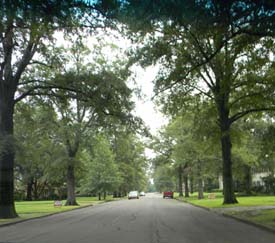 drive encountered sporadic light traffic, and took us in and out of many different neighborhoods. There were ‘nice’ sections, and not so nice sections, but even driving through the not so nice sections, we never once felt uncomfortable. We noticed some areas had relatively well maintained homes right next to rundown ‘shack like’ buildings, while other areas looked completely destitute. Economically speaking, Mississippi is
drive encountered sporadic light traffic, and took us in and out of many different neighborhoods. There were ‘nice’ sections, and not so nice sections, but even driving through the not so nice sections, we never once felt uncomfortable. We noticed some areas had relatively well maintained homes right next to rundown ‘shack like’ buildings, while other areas looked completely destitute. Economically speaking, Mississippi is 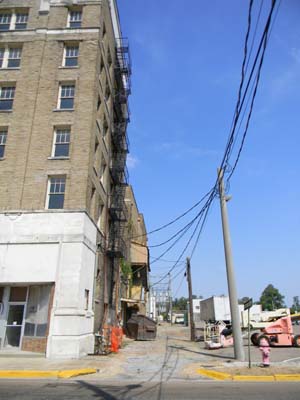 the poorest state in America, and this struggle was evident. How could a place so rich in culture and history, it’s musical heritage literally the foundation of all modern music, become so neglected and forgotten?
the poorest state in America, and this struggle was evident. How could a place so rich in culture and history, it’s musical heritage literally the foundation of all modern music, become so neglected and forgotten?
A little while later we were driving by Red’s on the way back to the Inn when I noticed a car parked out front. The front door was open, so I stopped in for a quick hello. During our brief chat Red asked me where I was from. “We’re from Nashville and came here to celebrate Kelly’s birthday.” “Nashville, now that’s a dangerous place!” he proclaimed, and I nodded my head in agreement. He went on to tell about some of the town’s biggest talents growing up within just a few miles of this spot. “John Lee Hooker grew up just a couple miles from here. Muddy Waters grew up about 5 miles from here. Ike Turner used to live right across that bridge.” He went on to tell about how in the old days, when a lot of these guys started becoming successful, that’s when their problems really began. “Once they started making money, they bought new houses and cars, only to lose it all once they split up with their old ladies. Sometimes, after they’d become successful, they couldn’t afford to have careers, so they’d just quit for a while.” So goes the life of a bluesman.
Saturday Dusk at the Inn
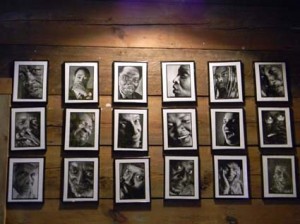 We returned to our ‘new shack’ and ate dinner, after which I decided to take one more walk around for some photos. The music room in the ‘Cotton Gin’ contains some beautiful spectacles, and I just stood there for a moment upon entering, soaking in its woody vibe. Memorabilia and signs from a forgotten era in the South’s not so distant past were constantly evident, and at times I couldn’t tell whether I was standing in a music hall or some sort of cultural exposé. The fact that blues recordings can be heard literally all over this plantation only add to the mystique. A sign bearing the words ‘Dentons Ice Cream – it’s real food’, a portrait of Elvis, a pre-1950s looking Schlitz beer sign, an old Coke machine – not a hint of anything modern except for the two PA speakers on the stage. I was beginning to feel like this entire Clarksdale experience was the junior high school field trip that I never had, but should have had. This kind of culture and history just can’t be learned in a textbook.
We returned to our ‘new shack’ and ate dinner, after which I decided to take one more walk around for some photos. The music room in the ‘Cotton Gin’ contains some beautiful spectacles, and I just stood there for a moment upon entering, soaking in its woody vibe. Memorabilia and signs from a forgotten era in the South’s not so distant past were constantly evident, and at times I couldn’t tell whether I was standing in a music hall or some sort of cultural exposé. The fact that blues recordings can be heard literally all over this plantation only add to the mystique. A sign bearing the words ‘Dentons Ice Cream – it’s real food’, a portrait of Elvis, a pre-1950s looking Schlitz beer sign, an old Coke machine – not a hint of anything modern except for the two PA speakers on the stage. I was beginning to feel like this entire Clarksdale experience was the junior high school field trip that I never had, but should have had. This kind of culture and history just can’t be learned in a textbook.
Red’s blues party with T-Model Ford and friends
It was about 7:30 when we pulled up to Red’s and, unlike the night before, the place already had a bit of a crowd. We walked in toting my guitar and amp, as Red requested, set them down near the music area and found a seat. T-Model was already there, sitting on a chair next to the drums and lightly playing some bluesy guitar riffs. His 12-year-old grandson ‘Stud’ is T-models regular drummer, and was already seated behind the drums. I went to the bar to say hi to Red, bought a couple of beers and returned to the table. A few minutes later T-Models light strumming morphed into the beginning of his set, almost unnoticed. The crowd grew quiet as soon as he began singing in his deep resonant voice, his chilling cries slicing through the night air like a razor. We sat mesmerized, and the crowd showed appreciation after each song. About a half hour into his set he asked “Where’s that other gee-tar man?” I raised my hand, and he waved me to the stage with an inviting gesture.
As soon as I set up my amp and plugged in my guitar we were off and running. He never announced any song in advance, he would just start playing a rhythm, a couple of bars later Stud would follow suit, and I would jump in as soon as I could figure out what they were doing. Before I knew it, the place was a rockin’ and I was holding on for dear life. Every once in a while, in between songs, T-Model would grab a glass of whiskey from the top of his amp, hold it up, and proclaim with a passionate howl “Jack Daniels time!” evoking an excited response from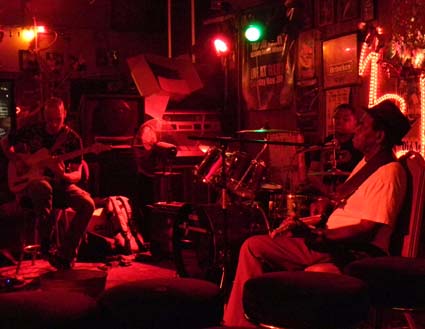 the crowd every time. Beginning to feel a little left out, I signaled Kelly to bring me a glass of whiskey, which, after taking a healthy swig from, I set on a stool beside me. Gradually, the place filled up and we just kept on playing. I recognized some of the faces from the night before, but many newcomers were there as well. When T-Model asked the crowd were they were all from, some of the answers were different than the night before, but still just as diverse – Wisconsin, Spain, Louisiana, Germany, among other distant places.
the crowd every time. Beginning to feel a little left out, I signaled Kelly to bring me a glass of whiskey, which, after taking a healthy swig from, I set on a stool beside me. Gradually, the place filled up and we just kept on playing. I recognized some of the faces from the night before, but many newcomers were there as well. When T-Model asked the crowd were they were all from, some of the answers were different than the night before, but still just as diverse – Wisconsin, Spain, Louisiana, Germany, among other distant places.
Following T-Model in his unique brand of Delta blues was as much an education as anything else. Unique to his style is a peculiar notion of changing chords on random beats, something that Stud is exceptional at following, and I was learning. This required intense concentration on my part, and I rarely took my eyes off of T. Apparently, it was all working quite well, as the audience constantly showed their approval. Several times throughout the night the dance floor again erupted with the kind of sexy and provocative moves that could only happen in a juke joint in the deep South. At some point in the middle of all this, Dingo asked if ‘Gypsy’, the blues guitarist from Japan, could use my amp for a couple of songs. He played a couple, and then T-Model motioned to me back to the stage. A local harp player then sat in for a few, the crowd still grooving hard. Around 11:30 things began to wind down, T-Model had been playing for nearly 3 1/2 hours straight and it seemed like he had said everything that needed to be said.
As I put my gear away, I couldn’t help but thinking how lucky I was to be invited to play a whole night with a living blues legend in a real juke joint. We had a few photos taken with Red and the gang, and thanked everybody for making our first trip to Clarksdale such a wonderful experience. I commented to Dingo about how great it was that they let other players sit in. “We let everybody play. If they’re good, then they can keep on playing. If they’re not too good, then we just kinda eeeeease em’ on out after a couple of songs. But everybody gets to play at Red’s.” I thanked T-Model for letting me play, and he shook my hand and said “Thank You!” Red and his friends had welcomed us into their world, and their openness warmed our souls. It was a truly magical night!
Nightcap at the Shack
Back at the Shack Up Inn a few minutes later, we grabbed a couple of beers and went out to sit on the giant porch swing behind the lobby to unwind. We chatted with several other visitors, and it seemed everybody we talked to had been at Red’s at some point over the weekend. College kids from LSU, a couple vacationing from San Francisco, even Marc, the front desk clerk had gathered with us to enjoy some late-night cheer. It wasn’t long before some acoustic guitars came out, and we all sat around for a little while longer strumming and singing into the night. I couldn’t believe that we were actually going to have to leave this place!
Clarksdale, Mississippi – Intro and Verse One
The Drive
It was noon on Thursday, September 23 when we left our Pegram, TN home bound for Clarksdale, Mississippi. Our route took us west on Interstate 40 for about 200 miles to Memphis, and while this stretch of I-40 is typically a rather boring drive, on this hot summer day, whatever was lacking in visual stimulation was replaced with anticipation. Although we had done a fair amount of research, we still didn’t know exactly what to expect in Clarksdale, so our excited conversations ultimately kept us from noticing that the scenery out the car window hadn’t changed much for the first three hours of the trip.
At Memphis we turned south onto Interstate 55 and entered Mississippi, and while the first hour of I-55 wasn’t anything visually 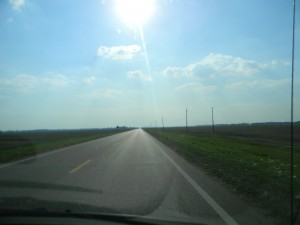 extraordinary, as soon as we turned west on to Highway 278 it felt like we entered a new world. The dense forest that had occupied both sides of the road only minutes before vanished to reveal a wide open view of the Delta plane. Cotton fields stretching to the horizon, cut in two by the road on which we traveled, a seemi
extraordinary, as soon as we turned west on to Highway 278 it felt like we entered a new world. The dense forest that had occupied both sides of the road only minutes before vanished to reveal a wide open view of the Delta plane. Cotton fields stretching to the horizon, cut in two by the road on which we traveled, a seemi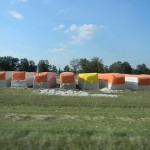 ngly endless road, straight, flat, and disappearing as far into the distance as the eye could see. Aside from other vehicles on the highway, the occasional farmhouse, and farm equipment sparsely scattered throughout the fields, the vastness of this geography was otherworldly. Although this last 40 or so miles was the shortest leg of the drive, our virgin viewing of this fertile Delta plane was empowering and made us feel a bit the wiser, almost as if we were the first explorers to set foot upon a newly discovered continent.
ngly endless road, straight, flat, and disappearing as far into the distance as the eye could see. Aside from other vehicles on the highway, the occasional farmhouse, and farm equipment sparsely scattered throughout the fields, the vastness of this geography was otherworldly. Although this last 40 or so miles was the shortest leg of the drive, our virgin viewing of this fertile Delta plane was empowering and made us feel a bit the wiser, almost as if we were the first explorers to set foot upon a newly discovered continent.
The Shack Up Inn and The Robert Clay Shack
Upon entering Clarksdale, located in Coahoma County, Mississippi, we turned south onto Highway 49 for a couple of miles and found 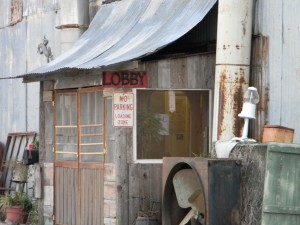 our way to the Hopson Plantation and the location of the place we would be staying, The Shack Up Inn. As we crossed over some railroad tracks, several old ‘barn-like’ buildings covered with rusty corrugated tin came into view, and we passed a row of shacks as we began searching for the lobby. At first glance the main entrance appeared to be a cross between an antique store and a junkyard, and if
our way to the Hopson Plantation and the location of the place we would be staying, The Shack Up Inn. As we crossed over some railroad tracks, several old ‘barn-like’ buildings covered with rusty corrugated tin came into view, and we passed a row of shacks as we began searching for the lobby. At first glance the main entrance appeared to be a cross between an antique store and a junkyard, and if 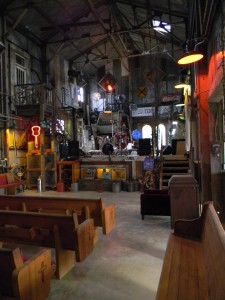 it were not for a small red sign bearing the hand-painted word ‘lobby’, we might have driven right by. We were greeted warmly by Marc, the woman working at the front desk, and she checked us in while giving us a quick overview of the Inn and some other local attractions. The main lobby is housed within an enormous ‘cotton gin’, and on the other side of the lobby walls the large open space has been transformed into a music hall. After checking in we took a few moments to explore this magnificent room which featured a stage at one end, and church pews and other miscellaneous seating at the other. After a few minutes of soaking in some very unique rustic folk art, which seemed to cover every square inch of this huge room, we headed over to our shack to get settled.
it were not for a small red sign bearing the hand-painted word ‘lobby’, we might have driven right by. We were greeted warmly by Marc, the woman working at the front desk, and she checked us in while giving us a quick overview of the Inn and some other local attractions. The main lobby is housed within an enormous ‘cotton gin’, and on the other side of the lobby walls the large open space has been transformed into a music hall. After checking in we took a few moments to explore this magnificent room which featured a stage at one end, and church pews and other miscellaneous seating at the other. After a few minutes of soaking in some very unique rustic folk art, which seemed to cover every square inch of this huge room, we headed over to our shack to get settled.
We fell in love with ‘the Robert Clay shack’ almost as soon as we set foot within. Blues music, courtesy a small TV tuned to Sirus radio’s Bluesville (the only channel available) was playing softly as we took a look around and, like the lobby, this interior was a folk art spectacle as well. As I would later learn from Bill, one of the owners, this is their ‘flagship shack’, and it showed. A bedroom at one end, a small bathroom, and an open concept kitchen that expanded into a living room all felt warm and inviting. An old church pew made for a bench, a slightly out of tune piano in the corner, and a screened in back porch only added to the charm. Much of the furnishings and decor looked like 1950’s 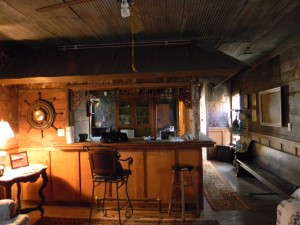 era or earlier, and this is obviously part of the intended experience. Bill would later tell me a little history about this shack.
era or earlier, and this is obviously part of the intended experience. Bill would later tell me a little history about this shack.
In another town in Mississippi, a sharecropper named Robert Clay lived his entire life in this humble abode, raising several sons by himself. When he was an old man, his sons, having moved out many years prior, tried to get him to leave this place and come live with them but he refused. He died an old man in the home in which he lived most of his life, and sometime after his death the shack was moved to it’s current location. After renovating the main body of the shack, the workers, upon exploring the attic to install duct work, discovered a whiskey still, making at least one reason apparent as to why Robert refused to leave. This kind of history just can’t be had at a Holiday Inn or Best Western and only added to the mystique.
One Amazing Sunset
After getting settled in and eating dinner we decided to walk around the grounds for a bit to take in some sites. While exploring the courtyard, the sun began to set on the distant horizon. We stood in wonderment as the sky transformed through a myriad of colors while the sun grew bigger and bigger before disappearing beneath the edge of the earth. In the last few moments before it became invisible beneath the horizon, the sky was on fire and time seemed to stand still. We took a few pictures to preserve the moment, and even though the photos are quite striking, it seems that some magical moments are intended for a single moment in time, coming and going like a breath of wind.
Blues Jam at Ground Zero
A little while later we headed out to the Ground Zero Blues Club, co-owned by Coahoma county resident Morgan Freeman, in downtown Clarksdale to attend the weekly Thursday night blues jam. This week it was being hosted by a local favorite, Big Anthony, and he was already on stage playing some fiery blues with his band when we walked in. Walking into a dark and unfamiliar night club with my guitar slung over my shoulder is something I’ve done many times before, but on this warm summer night in the deep South I must admit I was a little nervous, at least initially. The doorman was friendly enough, as was our waitress, and we gradually began to feel more comfortable after ordering a couple of beers and enjoying some of the show. Big Anthony, backed by a strong rhythm section of bass and drums, was playing some authentic Delta blues, his deep voice full of character, his guitar playing driving and relentless.
They took a break and then got up the first jammer, an older gentleman on vacation with his wife from Canada. After loaning this 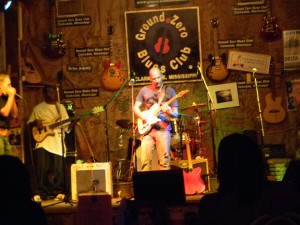 fellow his guitar for a couple of songs Anthony returned to the stage and called me up. Backed by the house drummer and bassist, I ripped through ‘Done Somebody Wrong’, ‘Goin’ Down’, and ‘Rock Me Baby’, and was quite pleased to receive a response that was somewhat over-the-top. Before leaving the stage, I announced that it was Kelly’s birthday and that we had come to Clarksdale to celebrate it, and several people applauded. As I exited the stage I got several compliments from other musicians who were waiting their turns in the wings. A few minutes later I walked over to the bar to get another beer and an older woman said to me “You were really good, but you don’t look like a blues musician.” “Blues musicians come in all shapes and sizes.” was the clarifying response I gave her before returning to my seat.
fellow his guitar for a couple of songs Anthony returned to the stage and called me up. Backed by the house drummer and bassist, I ripped through ‘Done Somebody Wrong’, ‘Goin’ Down’, and ‘Rock Me Baby’, and was quite pleased to receive a response that was somewhat over-the-top. Before leaving the stage, I announced that it was Kelly’s birthday and that we had come to Clarksdale to celebrate it, and several people applauded. As I exited the stage I got several compliments from other musicians who were waiting their turns in the wings. A few minutes later I walked over to the bar to get another beer and an older woman said to me “You were really good, but you don’t look like a blues musician.” “Blues musicians come in all shapes and sizes.” was the clarifying response I gave her before returning to my seat.
By this point we were starting to get kind of tired so we headed back to the shack. Our first day of this three-day trip drawing to a close, we sipped a beer on the back porch reminiscing our experiences. So far, this little town of Clarksdale had been a wonderful host, and we turned in for the night, excited for what Friday might bring.
Rhett Akins at Old Threshers in Shelbina; What’s a Little Mud When You’ve Got Friends with Tractors?
This past weekend was one of the last outings of the 2010 festival season for Rhett Akins and gang. Like many things in life, outdoor festivals are like a potluck dinner – you never know what’s under the lid of that next casserole dish. That goes for not just the event itself, but to the friend and foe of every outdoor show – the weather. We’ll get to the weather debacle in a minute.
The event we would be playing on this eve was ‘The Old Threshers’ at the Shelbina Fairgrounds, in Shelbina Missouri. For those of you 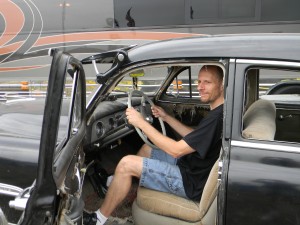 not in the know, an old threshers event is kind of a fair with a tractor theme, and this event sported some rare old beauties right out of yesteryear. After parking our bus and getting situated, we took a walk around the fairgrounds to see the sights. We didn’t get but 5 feet from the bus door when the first spectacle presented itself in the form of a 51 Chevy, the owner of which notified us that this vehicle was ours to use for the day. Who needs a runner when you’ve got a 51 Chevy at your disposal! After a few minutes of checking out and photographing this rarity, we set out on foot, camera in hand.
not in the know, an old threshers event is kind of a fair with a tractor theme, and this event sported some rare old beauties right out of yesteryear. After parking our bus and getting situated, we took a walk around the fairgrounds to see the sights. We didn’t get but 5 feet from the bus door when the first spectacle presented itself in the form of a 51 Chevy, the owner of which notified us that this vehicle was ours to use for the day. Who needs a runner when you’ve got a 51 Chevy at your disposal! After a few minutes of checking out and photographing this rarity, we set out on foot, camera in hand.
Right around the corner we stumbled upon a bluegrass band consisting of a couple of fellows on acoustic guitars, two banjo players, a woman playing a mandolin, they even had a wash tub base. They were pretty 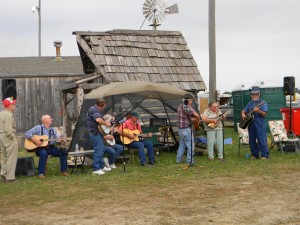 good too, and we stopped to listen for a few. It was then on to the blacksmith shop where we checked out some fine metal crafting by some locals. We dodged a few big tractors on the way over to an old schoolhouse, passing
good too, and we stopped to listen for a few. It was then on to the blacksmith shop where we checked out some fine metal crafting by some locals. We dodged a few big tractors on the way over to an old schoolhouse, passing 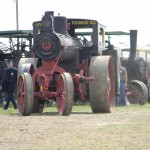 through an Amish village along the way. The old schoolhouse reeked of personality, circa late 1800s/early 1900s. As some kids were writing on the blackboard we took a look around, snapping a few more photos. This part of the day actually felt more like a class field trip than it did a gig. It was now getting to be time for load in, so we returned to the stage area to get to work.
through an Amish village along the way. The old schoolhouse reeked of personality, circa late 1800s/early 1900s. As some kids were writing on the blackboard we took a look around, snapping a few more photos. This part of the day actually felt more like a class field trip than it did a gig. It was now getting to be time for load in, so we returned to the stage area to get to work.
After our gear was loaded onto the deck, we set up and went about our sound check. Once we got it dialed in pretty good we took a few minutes to learn one of Rhett’s most recent songs, ‘Chicks, Trucks, and Beer’, a catchy little ditty with a funky beat he wrote a couple of days prior. It was then off to the hotel for showers, and this was when the weather started to go downhill. The sky grew dark, almost as black as night on the horizon, the wind picked up, and a short while later a massive downpour ensued. People were leaving in droves as we received over an inch of rain in about 45 minutes. Back on the deck, stagehands and local crew scurried to tarp the equipment, but nothing could be done to prevent the rest of this once dusty Fairgrounds from becoming one gigantic mud pit.
After the rain stopped, tractors began scraping down the mud in front of the stage. Underneath the mud was more mud, so they had to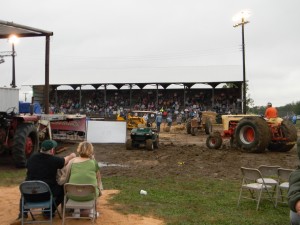 bring out bales of hay and spread straw to create acceptable conditions for the concertgoers. They also ran a series of boards for us to walk on from the stage to the bus (yes, the mud was actually that bad). Despite these obstacles we weren’t going to let a little rain and mud ruin this day, and by 7:15 the opening band ‘Little Dixie’ was taking the stage. Even though the deluge had run off a good portion of the festival attendees, there was still at least 1000 or so that stuck around for our show. At 8:15 we were off and running and about three songs in Rhett played ‘Friends with Tractors’ an obvious crowd pleaser for an
bring out bales of hay and spread straw to create acceptable conditions for the concertgoers. They also ran a series of boards for us to walk on from the stage to the bus (yes, the mud was actually that bad). Despite these obstacles we weren’t going to let a little rain and mud ruin this day, and by 7:15 the opening band ‘Little Dixie’ was taking the stage. Even though the deluge had run off a good portion of the festival attendees, there was still at least 1000 or so that stuck around for our show. At 8:15 we were off and running and about three songs in Rhett played ‘Friends with Tractors’ an obvious crowd pleaser for an 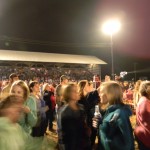 event such as this. The crowd was responsive and singing along, despite a strong prevailing wind that was a bit overbearing at times. About an hour into our show some massive lightning strikes began to appear on the horizon, so we did a couple of more songs to finish our set.
event such as this. The crowd was responsive and singing along, despite a strong prevailing wind that was a bit overbearing at times. About an hour into our show some massive lightning strikes began to appear on the horizon, so we did a couple of more songs to finish our set.
Our show complete, we tore down our gear and found our way over to the ‘Bluegrass Barn’ where the afternoon band was engaged in a little ‘pickin’ and grinnin’ after party. Rhett even sat in for a couple, leading the band through the Hank Williams classic ‘Honky-Tonkin’ and a couple of other rarities. The spirits were high, and everyone from this nice community made us feel right at home. A little while later, Steve made a mad dash with the bus across the muddy field, tires spinning every inch of the way. When we finally made it to the street, he made a big sigh of relief, perhaps having flashbacks of having to be towed out of a mud bog in Alabama earlier in the summer. Even if we had got stuck I wouldn’t have been too worried, at this show we definitely had ‘friends with tractors”. A few minutes later, and we were rolling down the highway. Thanks for making it a great event Shelbina!
Playing for free or getting paid to play; What is playing music worth to you?
Anyone who has ever gigged in Nashville knows that it is hard to make any real money by playing in the clubs around town. Aside from a very small handful of gigs that might pay $75-$100 per player, most offer minimal to no pay – some offering a base pay $20 to $30 plus tips, a lot more offer tips only (which often means essentially playing for free), and a few are even pay to play. Even on the base pay plus tips gigs quite often a player will only take home $25 or $30.
So from time to time the “playing for free” debate rears up in conversations. Some say that performing music in public for free is the only way they can gain experience, obtain exposure, make connections, and have any sort of musical life beyond practicing in the basement. Others claim that playing for free makes it harder to receive fair (or any) compensation for their services. Why would clubs and venues pay for bands and players if most will do it for free?
While both are legitimate arguments, to understand why things are the way they are I think it is important to consider the overall role of music and musical performers throughout history, not just in today’s world.
Daniel Levitin, in his book “This Is Your Brain on Music” talks about music being at the heart of human evolution.
“No known human culture now or anytime in the recorded past lacked music. Some of the oldest physical artifacts found in human and protohuman excavation sites are musical instruments.”
He continues
Even more so in non-industrialized cultures than in modern Western societies, music is and was a part of the fabric of everyday life. Only relatively recently in our own culture, 500 years or so ago, did a distinction arise that cut society in two, forming separate classes of music performers and music listeners. Throughout most of the world and for most of human history, music making was as natural an activity as breathing and walking, and everyone participated. Concert halls, dedicated to the performance of music, arose only in the last several centuries.
With that, I state my case that music has always been there and is an important and crucial part of our being. It is perhaps the earliest form of communication. Somewhere along the way this art form, this way of life, morphed into a product, or a commodity.
In the book “Muse Power: How Recreational Musicmaking Heals Depression and Other Symptoms of Modern Culture” by Cheri D. Lunn writes:
Prior to the 20th century, the concept of selling music wasn’t really commonplace. One of the very first to consider music as a marketable commodity, was Wolfgang Amadeus Mozart. “In the mid-to-late 1700s, performers and composers such as Wolfgang Amadeus Mozart began to seek commercial opportunities to market their music and performances to the general public.” (5 Wikipedia /Dear Constanze The Guardian) Before that, in more traditional cultures, the Griots, bards, and musicians were cared for by their communities, as equals in the tribe doing their part to contribute. In Europe, up until the 1700’s music was supported by patronage from the aristocracy, or the church, and so there was no need for artists to sell themselves; and so the concept of selling music had just not yet come to be.
A crucial change in the history of folk music began during the twentieth century with folk artists adopting the very western concept of “marketing for money,” or “selling” the music of the people. In this time, a new genre of popular music arose that basically became an imitation to the original traditions of folk music as it was sung by ordinary people. These “folk” artists marketed themselves alongside more popular and modern emerging artists and created a niche for themselves by performing traditional music and songs in amplified concerts, and disseminating their work by recordings and broadcasting.
But along with the commercialization of music and musical performers, especially now in the digital age, comes somewhat of a desensitization to music, or what I call a ‘dumbing down’ of the masses in this regard. In today’s world, music is heard everywhere – from traditional advertising like TV and radio commercials to ring tones and ring backs, from video games to iPods, today’s Internet generation is saturated with digital music overload. In many situations, recorded music is now free, and with the advent of software like garage band, millions can now make homemade recordings to further flood the airwaves. In the midst of this oversaturation, TV shows like “American Idol”, “Nashville Star”, and “America’s Got Talent” have perpetuated the false reality that the masses can also now obtain superstardom.
Put all this together, and you’ve got more people than ever trying to get into the “music business”. But as millions more each year try to enter this world, the opportunities for them will inevitably shrink. There are only so many bars and nightclubs that need live music.
If you consider this history, it is fair to say that the concept of being paid for your music, or paid to play your music, is relatively new and largely an invention of our modern capitalistic society. Don’t get me wrong, I’m not suggesting we abandon this concept, this is how I am currently earning the bulk of my living. What I am suggesting is that the evolution of the paid musical performer may have been accidental, and is not necessarily a sustainable vocation in this modern world.
Music belongs to everybody. We need to better understand the role that music has played in our history, and how the cultivation of music as a part of our culture can benefit our world as well as the futures of our children. Does our future hold a world in which musical performers are paid for their ‘services’, or will the performance of music one day return to something that is shared by everybody? Did society really benefit when music was turned into a product? Do we deserve to be “paid to play”? I don’t know if I’ll always be able to earn a living from music, but even if one day I can’t, I’ll always play music, doing so enriches my life.
What is music, and the art of performing it worth to you?
Rhett Akins Plays Balloons, Tunes and BBQ Festival in Bowling Green Kentucky
Saturday night’s show at the U.S. Bank Balloons, Tunes and BBQ Festival in Bowling Green Kentucky turned out to be a huge success, but earlier in the day things were looking pretty bleak. All week long the weather forecast showed a strong possibility of severe weather for this area, as the remnants of Tropical Storm Hermine were projected to move through. When we arrived on site at the Warren County Regional Airport a strong steady wind was already blowing, despite an otherwise beautiful sunny day.
Right around the time we were about to start micing up our instruments for soundcheck, the sky grew ominously dark, and a few minutes later a strong gust of wind knocked over a large column of PA speakers. Fortunately, nobody got hurt, but it was a frightful moment. As a downpour was imminent, we quickly scrambled to put tarps over our stage gear. Minutes later we watched from the bus window as a strong steady rain pummeled the airport grounds. Just when we thought our day was completely doomed the rain subsided, and a short while later the sun returned to dry out the rain soaked grounds.
 As it turns out, we got real lucky and it never did rain again. The first two days of the festival had been a complete washout due to the weather, but by late afternoon the winds had died down, and some hot air balloons began to permeate the sky for the first time on this weekend. By the time the first group, Easy Street, went on stage at 5:30 there was already a couple of thousand people in front of the large mobile stage, and their set was well received. A little while later, after the second band, Floord, was finished with their set, Nick Hoffman (Kenny Chesney’s fiddle player) took the stage with his band. During Nick’ set I organized and led a large meet and greet backstage with some radio station contest winners who were more than excited to meet Rhett.
As it turns out, we got real lucky and it never did rain again. The first two days of the festival had been a complete washout due to the weather, but by late afternoon the winds had died down, and some hot air balloons began to permeate the sky for the first time on this weekend. By the time the first group, Easy Street, went on stage at 5:30 there was already a couple of thousand people in front of the large mobile stage, and their set was well received. A little while later, after the second band, Floord, was finished with their set, Nick Hoffman (Kenny Chesney’s fiddle player) took the stage with his band. During Nick’ set I organized and led a large meet and greet backstage with some radio station contest winners who were more than excited to meet Rhett.
At about 8:45 it was finally our turn for some stage time, the crowd had now swelled to around 10,000, and was at the peak of this annual  event’s outing. We dug in hard for a rockin’ 90 minute show, the crowd into it from the onset. About halfway through our show, Rhett brought up his son, Thomas Rhett to sing the soon-to-be classic ‘Duck Blind’. After this well received rendition, a woman somewhere near the front row yelled out “He’s real sexy too!” This helped prompt Rhett to prod young Thomas into doing one more song, ‘Tobacco’, one of Thomas’s original compositions which he performed solo acoustic. Apparently, Thomas takes after his dad, who bragged about his son’s first cut as a songwriter on Jason Aldeans’ latest album, and the fact that “Some day soon you’re going to be hearing Thomas Rhett on the radio too!” After Thomas left the stage to a roaring applause, we continued on with our set, and a little while later Rhett invited up Nick Hoffman to sit in for a couple of tunes on the fiddle. Rhett ended the show by playing a solo acoustic version of “Gimme That Girl” the blockbuster hit he wrote for Joe Nichols. This soft and soulful piece helped to wind down the electricity in the crowd, and upon its conclusion they began to slowly exit the concert grounds.
event’s outing. We dug in hard for a rockin’ 90 minute show, the crowd into it from the onset. About halfway through our show, Rhett brought up his son, Thomas Rhett to sing the soon-to-be classic ‘Duck Blind’. After this well received rendition, a woman somewhere near the front row yelled out “He’s real sexy too!” This helped prompt Rhett to prod young Thomas into doing one more song, ‘Tobacco’, one of Thomas’s original compositions which he performed solo acoustic. Apparently, Thomas takes after his dad, who bragged about his son’s first cut as a songwriter on Jason Aldeans’ latest album, and the fact that “Some day soon you’re going to be hearing Thomas Rhett on the radio too!” After Thomas left the stage to a roaring applause, we continued on with our set, and a little while later Rhett invited up Nick Hoffman to sit in for a couple of tunes on the fiddle. Rhett ended the show by playing a solo acoustic version of “Gimme That Girl” the blockbuster hit he wrote for Joe Nichols. This soft and soulful piece helped to wind down the electricity in the crowd, and upon its conclusion they began to slowly exit the concert grounds.
 It was a long day, but a good day, and we were all thrilled that the weather wound up being on our side. While this isn’t always the case with these kinds of outdoor shows, past experience has taught me to always hope for the best, while preparing for the worst. We’ve got two more outdoor shows on the books in the upcoming weeks. Hopefully, we’ll get lucky on those too!
It was a long day, but a good day, and we were all thrilled that the weather wound up being on our side. While this isn’t always the case with these kinds of outdoor shows, past experience has taught me to always hope for the best, while preparing for the worst. We’ve got two more outdoor shows on the books in the upcoming weeks. Hopefully, we’ll get lucky on those too!
My name is Eric Normand and welcome to ‘Country Concerts’!
I was talking to a college student a while back who said he was interested in becoming a tour manager. It turns out that one of his best friends is an aspiring young artist with a bright future, one who will likely need a tour manager someday. “What does a tour manager do?” he asked. The specific duties can vary depending on the tour, but in general, the tour manager oversees all aspects of the touring entourage and coordinates each concert with the event buyer, production company, and all other pertinent parties. My job as tour manager for Rhett Akins requires me to wear a lot of hats; tour manager, band leader, lead guitarist – officially; and guitar tech, stage manager, assistant merch person, travel agent, part-time bartender, and occasional guidance counselor – unofficially. There are eight members of our entourage – Rhett, myself, three other band members, a sound engineer, a merch person, and a bus driver, and it is my job to make sure they are well taken care of when we are touring. To give some perspective, I thought it might be fun to take you on a recent one off with Rhett and gang. This post will be a bit long, but then again so is the day of a tour manager.
Rhett Akins
09-04-10 – Clay County Days Festival – Manchester Kentucky
It was about 11:30 PM on Friday, September 3rd when Kelly and I arrive to the bus near Opryland in Nashville, TN. Most of the other guys are already there and our sound engineer, Mike Jaeger, and bassist, Clint Jacobs, help me load my gear , Rhett’s merch, and some bus stock into the bays underneath the bus. Assistant tour manager and merch specialist, Kelly Normand, begins stocking the refrigerator with bottled waters and putting away some of the other supplies (paper plates, solo cups, etc.). On this run we have a substitute driver, and after making his acquaintance, I give him some paperwork and discuss some specifics of the trip. A little while later we pull out, bound for London, KY, the location of the hotel we would be using for our show at Rawlings Stinson Park in Manchester Kentucky. My official duties complete for this workday, I enjoy some chill time in the front lounge with the guys for a bit before heading to bed (or heading to bunk, rather).
Like most of our weekend runs, our bus arrives to a hotel parking lot sometime early morning and I awake a few hours later to begin my day. My first duty is getting checked into our hotel rooms, and this can require a special skill set (called charm) to get into these rooms at the early hour of 9 AM (most hotel check-in’s are between 1 and 3 PM). After offering a warm greeting to the hotel front desk clerk, I introduce myself – “My name is Eric Normand, I’m the tour manager for Rhett Akins and we’ve got four rooms booked with you. I realize it’s still kind of early, but I was wondering if any of them are ready.” “We should have a couple of rooms cleaned and ready in about 20 minutes and the other two in about an hour” she notifies me. “Great, thanks.” I return to the bus and eat some breakfast before returning to the hotel lobby for the room keys.
By noon, most everyone is up and hanging out in the front lounge. Were watching “Stand by Me” on the flatscreen TV as we head off for the venue, a 20 mile, 30 minute drive. While enroute I call my contact at the event to notify him we are almost there. We arrive on site and back the bus into a fire station parking lot across the street from the park. This is the closest the bus will be able to get to the stage which is located about an eighth of a mile away, and I quickly realize I’m going to get in a fair amount of walking on this sunny 70° day. I walk off the bus and meet, Gene, my go-to guy from this event for the day. “Tell me what you guys need, and I make it happen.” he informs me. “Everybody’s pretty hungry, so the bus stock would be great. After that we’ll need a pickup truck and some stagehands to cart the gear over the stage, and a runner to take our driver back to the hotel.” A few minutes later our bus stock is arriving, and I began to coordinate the load in.
After everybody eats, I find the runner who then takes our driver back to the hotel to sleep, and we begin our set up and sound check. As I still have a lot of details to tend to, I try to set up my gear as quickly as possible. Before I can finish, the event buyer requests a brief meeting with Rhett, as well as the handling of settlement (payment). Gene takes me via golf cart back to the bus so we can bring Rhett to meet the owner who is down the street cooking our BBQ dinner on a giant smoker. A little while later I’m back to the stage with sound check in full swing. Mike has done a good job of ‘ringing out the monitors’ and we are pretty much ready for Rhett. After running through two songs and making a few minor adjustments everybody’s pretty happy with the sound, so we ‘spike and strike’ our monitors and pedal boards to make room for the opening act.
Typically, the conclusion of sound check would mean that we’re all returning to hotel rooms for showers, but as this day had a late afternoon sound check with an early show time, there wasn’t enough time. I told everyone this in advance, and most of them had already taken a quick shower late morning at the hotel. So today, it’s a couple hours of downtime on-site. Some of the guys go walking around the festival for a bit, others hang out on the bus watching college football, while Kelly and I explore a walking trail off the back side of the park. Dinner was served in the firehouse at five o’clock – a massive spread of pulled pork, ribs, potato salad, and some outstanding homemade creamed corn. In fact, the creamed corn tastes so much like corn, that I realize how little so many other ‘corn products’ actually taste like corn.
After dinner it’s time to set up our merch station, so I accompany Kelly to her tent to make sure she has everything she needs. Upon our arrival to her side stage location, I see that the event has provided a 10×10 pop-up tent, table, and a half a dozen folding chairs. While Kelly begins setting up her merch, I find one of the production company workers and ask him to run some power over to the tent for lighting. Once the lighting is set I begin preparing for Rhett’s meet and greet by texting him to notify him that it’s 10 minutes out. I verify with Gene that the meet and greet party has gathered, and deliver Rhett, sharpie in hand, to the green room. During the middle of this autograph-signing photo-op I get a text from Kelly stating that she needs more change and that one of her lights has a burned-out bulb. I locate a spare bulb and $100 worth of 5’s, make another walk to the stage area, and return to help wrap up the meet and greet.
I escort Rhett back to the bus, put a fresh battery in his in-ear wireless belt pack, and return to the stage to reset my gear. The opening band now finished and the stage clear, I place my pedal board, tune my guitar, and check my rig with a few quick power chords. I continue on to Rhett’s position, tuning his acoustic and checking it for signal, checking his vocal mic in the monitors and in the house, installing a pic clip with guitar pics to his mic stand, and placing set lists and a beverage on the stage floor by his monitor. The other band members are all at their stations checking their rigs, and a DJ is selling himself over the mic in that nonstop annoying ramble that only a DJ can do. The park is filled to capacity, somewhere around 4000, and we’re ready to go. I make one more walk back to the bus to shuttle Rhett over via golf cart. A few minutes later and were off and sailing on our 90 minute ‘countrified’ rockathon.
 In a day so full of endless details, the nightly concert is by far the high point for me. For these 90 minutes I get to play my guitar with a great band, behind a great front man, and it’s all about the music for me. Rhett, being the quintessential performer, possesses the uncanny ability to render a crowd in the palm of his hands in about as much time as it takes him to walk out onto the stage. The concertgoers on this particular night are no exception to this rule, and Rhett quickly wins them over. For this brief period, it doesn’t even seem like I’m working, after all, this is what I set out to do in the first place. Aside from our usual repertoire, one standout is an impromptu performance of Bon Jovi’s ‘Wanted Dead or Alive’ (playing in all those early cover bands sure comes in handy every once in a while) and Rhett’s son, Thomas Rhett, joining us to sing a great rendition of ‘Duck Blind’. 90 minutes later our performance is complete, and the captive audience slowly makes their retreat as Rhett rides back to the bus via golf cart while the band tears down the gear. I quickly transition from musician mindset back to road manager and instruct Gene to pull up a truck next to the stage for load out. We load the gear, ride over to the bus, and load it into the bays. I send the runner to pickup our driver, they return about an hour later, and we fire up the bus to ride off into the night. My workday done, I enjoy a frosty beverage in the front lounge with the gang. I awake on the bus the next morning back in Nashville, load my car, and get the fuel receipts and some other paperwork from the bus driver. “Great job everybody, see you next week!”
In a day so full of endless details, the nightly concert is by far the high point for me. For these 90 minutes I get to play my guitar with a great band, behind a great front man, and it’s all about the music for me. Rhett, being the quintessential performer, possesses the uncanny ability to render a crowd in the palm of his hands in about as much time as it takes him to walk out onto the stage. The concertgoers on this particular night are no exception to this rule, and Rhett quickly wins them over. For this brief period, it doesn’t even seem like I’m working, after all, this is what I set out to do in the first place. Aside from our usual repertoire, one standout is an impromptu performance of Bon Jovi’s ‘Wanted Dead or Alive’ (playing in all those early cover bands sure comes in handy every once in a while) and Rhett’s son, Thomas Rhett, joining us to sing a great rendition of ‘Duck Blind’. 90 minutes later our performance is complete, and the captive audience slowly makes their retreat as Rhett rides back to the bus via golf cart while the band tears down the gear. I quickly transition from musician mindset back to road manager and instruct Gene to pull up a truck next to the stage for load out. We load the gear, ride over to the bus, and load it into the bays. I send the runner to pickup our driver, they return about an hour later, and we fire up the bus to ride off into the night. My workday done, I enjoy a frosty beverage in the front lounge with the gang. I awake on the bus the next morning back in Nashville, load my car, and get the fuel receipts and some other paperwork from the bus driver. “Great job everybody, see you next week!”
This one-off is typical for a small to midsized tour, such as ours. On tours of this size and nature, the tour manager advances these details over the days and weeks preceding the show (quite often it is these advance phone calls and e-mails that make or break how well each show day and show goes). In the days after a weekend run, the tour manager addresses payroll, bank deposits, bus lease payment, and some light accounting duties while advancing upcoming shows. On a larger more active tour, there would simply be more tour members, more tour buses, and more equipment, and they would likely be staying out for longer periods of time. A day similar to the one I just described would be repeated in succession, kind of like Groundhog Day, each day beginning the same as the last – the view of an obscure parking lot from the bus window, somewhere far from home. On one of these tours, the ‘TM’ would still be the grand overseer, but would be delegating many of these roles to others – stage managers, guitar techs, etc. He still has to deal with all the same kinds of details, he just doesn’t have to wear as many hats. Don’t get me wrong, I’m not complaining about wearing so many hats, he probably doesn’t get to play guitar during the show.
My name is Eric Normand and welcome to ‘Country Concerts’!


